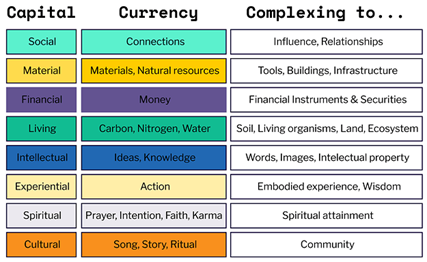ReFi is the combination of two distinct disciplines: regenerative economics and decentralized finance. Regenerative economics focuses on a balanced, circulatory flow of capital that integrates both positive and negative externalities while taking care of people and the commons. It explores how to design the economy to regenerate what has been lost and conserve what remains while ensuring long-term financial prosperity. Decentralized finance aims to remove centralized intermediaries to democratize both access to financial services and the management of the financial system itself. The goal of regenerative finance is to create financial instruments and products that incentivize the regeneration of natural systems.
One of the core instruments in doing that is redesigning money itself in a way that writes a new story for what it means to be an integral human being living on a shared planet. A story that encapsulates the values of caring, mutuality, and human flourishing.
Redesigning money requires understanding tokens (digital assets with a specific value) and tokenomics (token + economics), which makes visible and captures all the different forms and the eight manifestations of capital: social, material, financial, living, intellectual, experiential, spiritual, and cultural.
Several different regenerative finance technologies related to all eight forms of capital and currencies are shown below with integral worldview principles (as developed by Ken Wilber) and essential TE ethics.

Image Source: https://gov.gitcoin.co/t/the-donut-economy-x-8-forms-of-capital/10079
There are several different regenerative finance technologies that are being developed and used by investors and financial institutions. Some of the most popular regenerative finance technologies include Green bonds; Nature-based Solutions; Payment for ecosystem services; Carbon markets; Natural capital accounting; Green banking; etc.
ReFi must act to prevent the pervasive “greenwashing” or carbon tunnel vision. For a systemic regenerative solution to be fully holistic, carbon emissions and markets need to be only one of many variables included.

Image Source: https://www.skretting.com
ReFi aims to apply a 360º view to all the underlying symptoms in the diagram, with caring and nature-based systems thinking as the foundation. Since sustainability challenges stem from fragmented thinking and systems incentivizing degenerative behavior, holistic thinking and regenerative incentive systems must replace them.
Be aware that for ReFi and regenerative tokenomics to be truly regenerative, all aspects and dimensions (internal and external) need to be integrated. The principles and solutions proposed here to develop and apply integral regenerative tokenomics at scale are only viable if all the internal dimensions of human regeneration are equally taken care of.